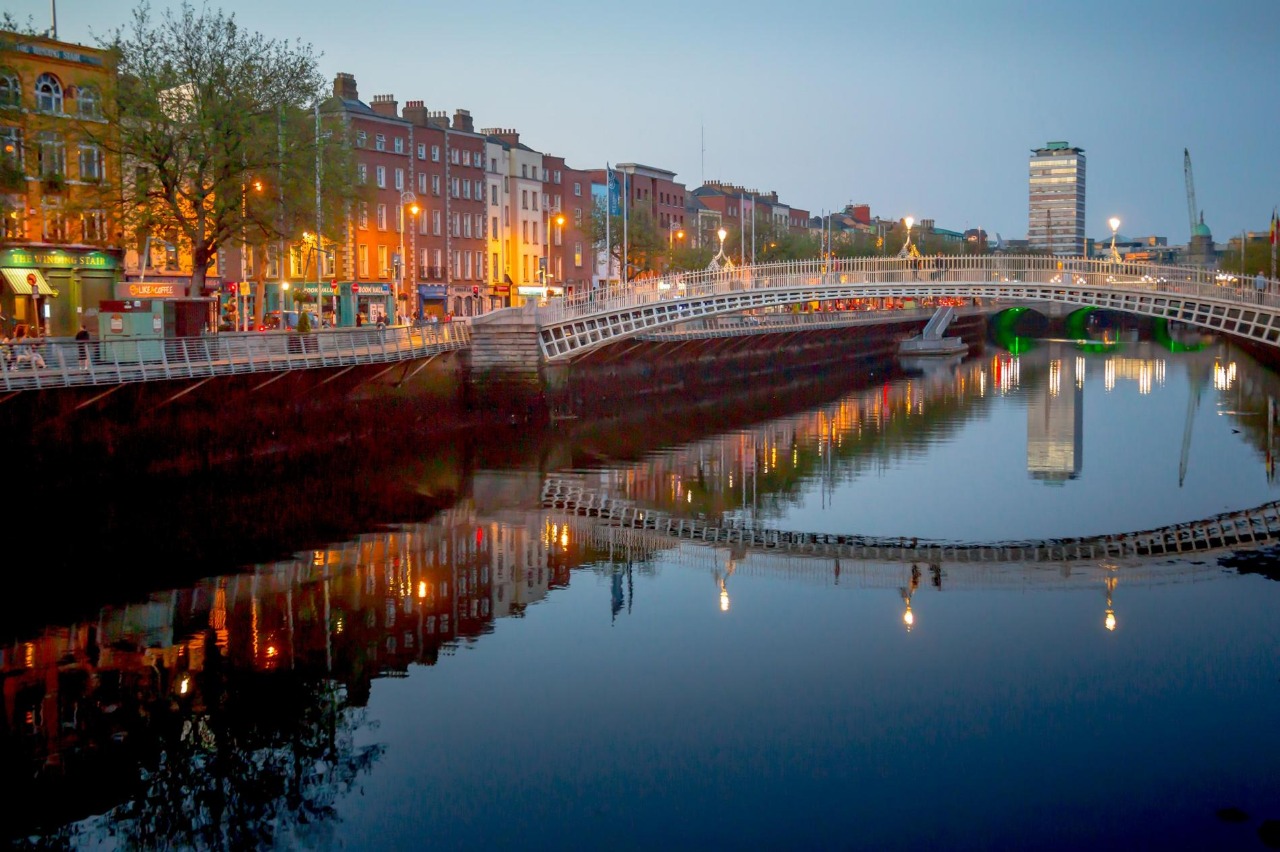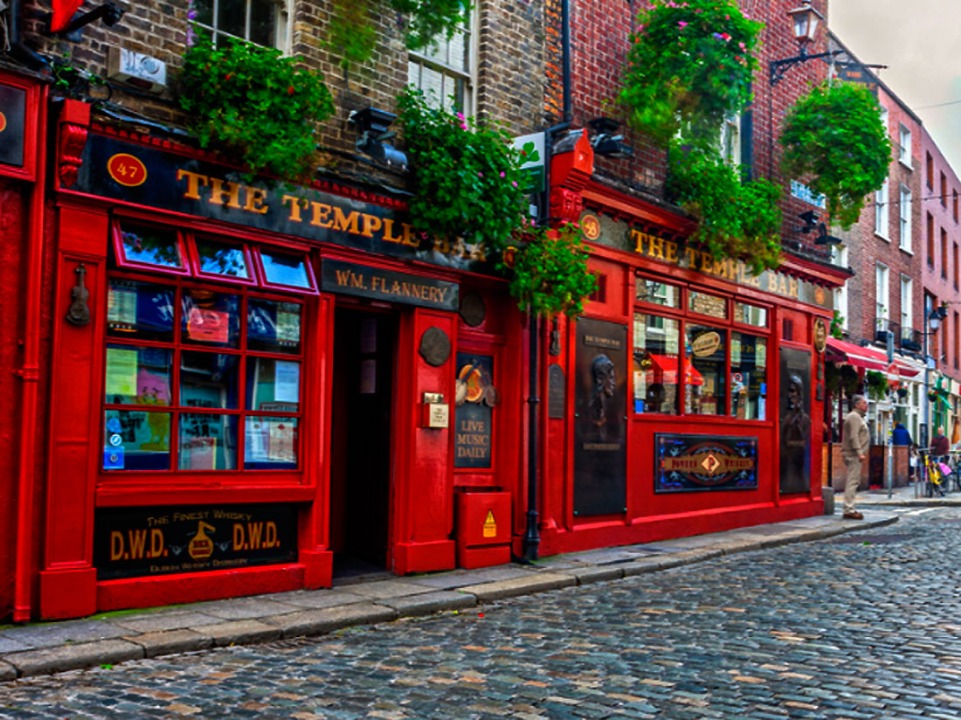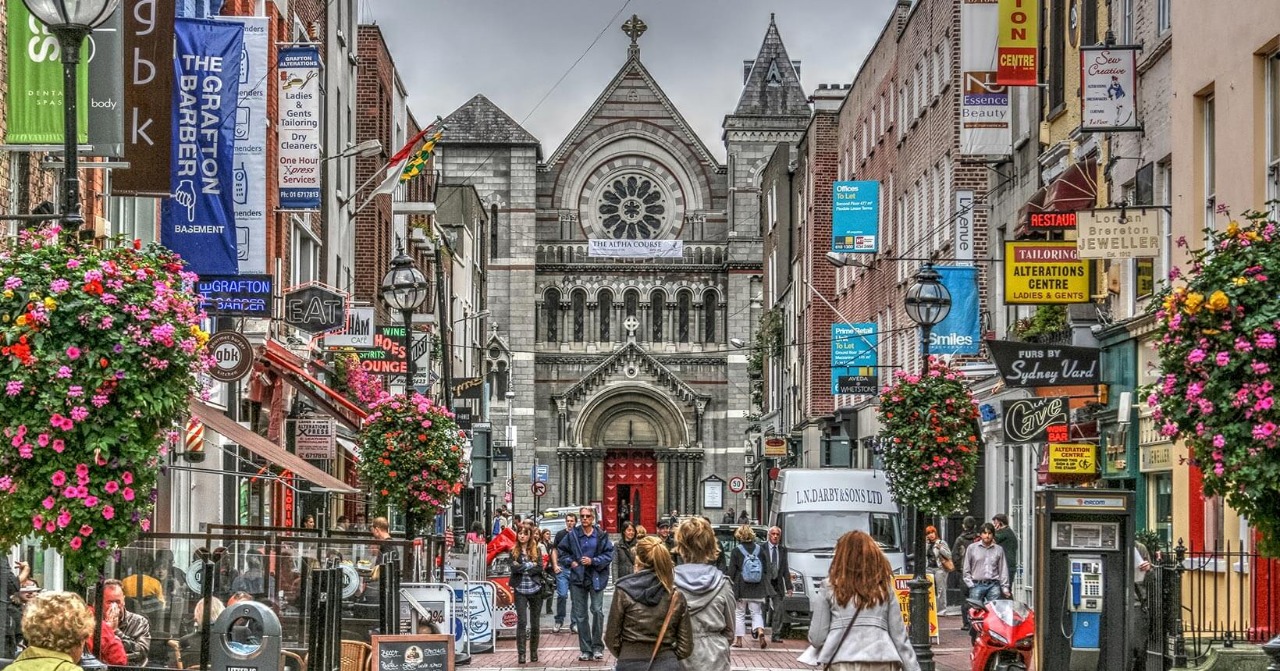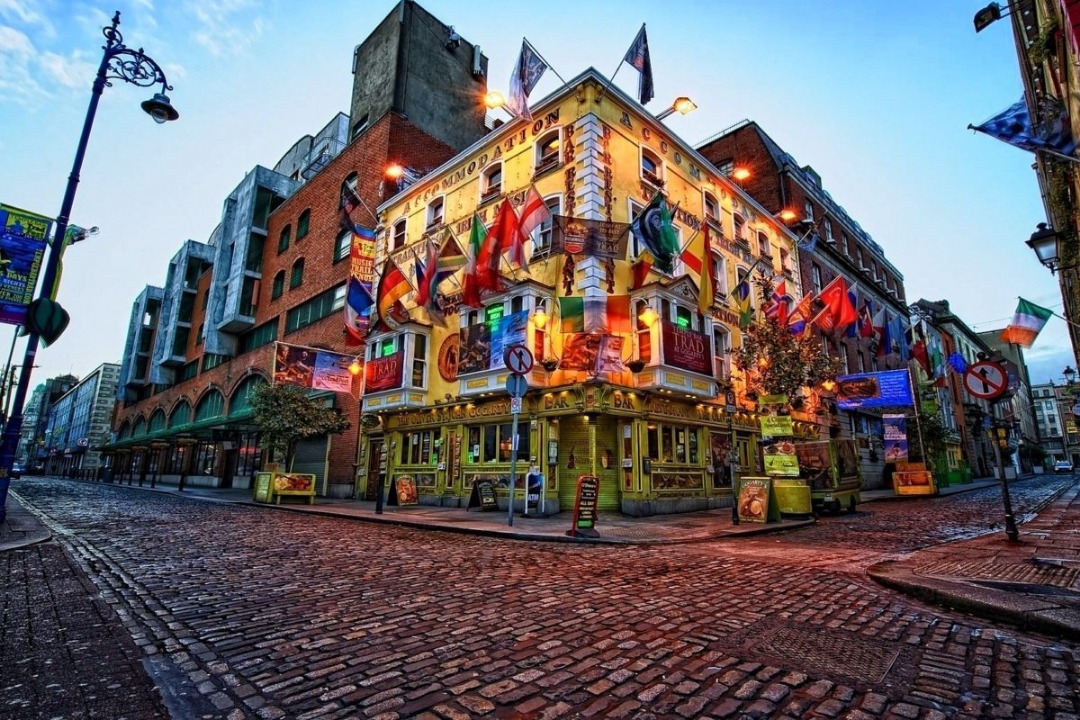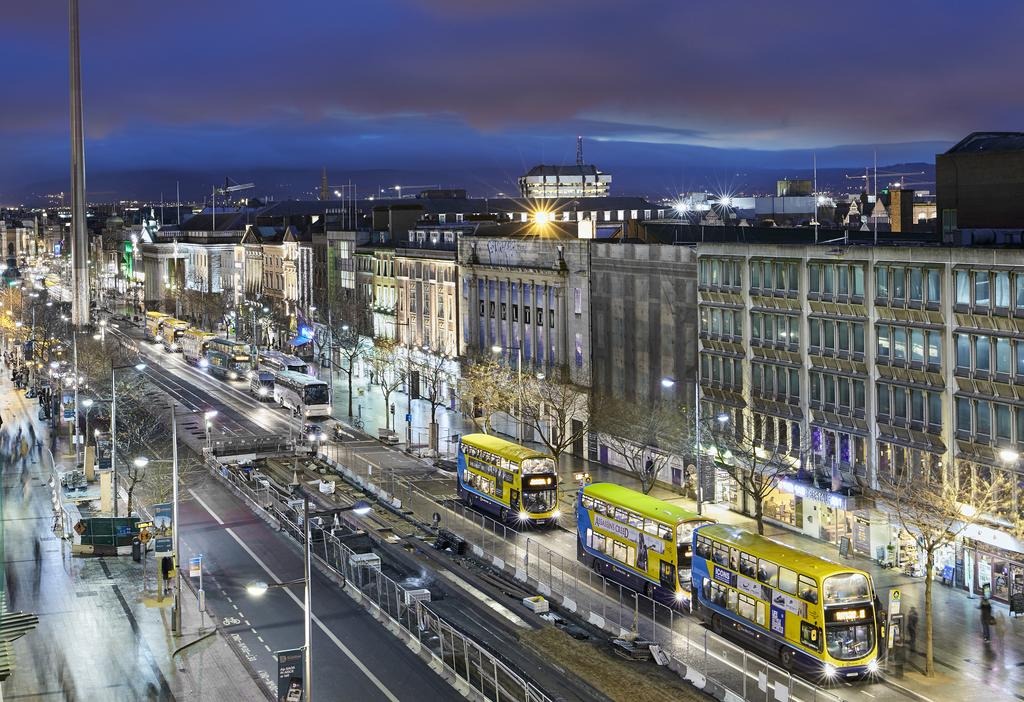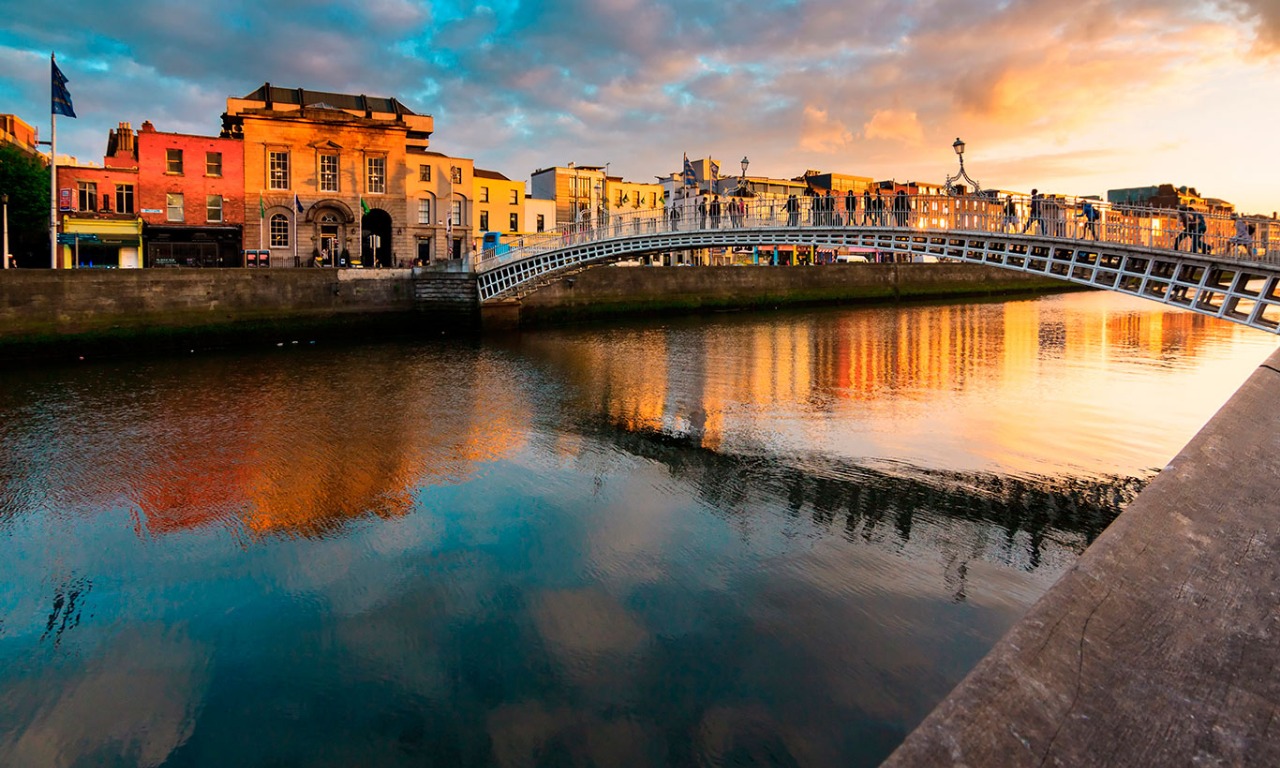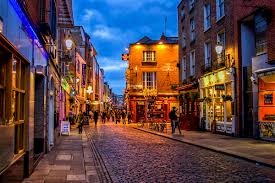Pictures of: Dublin, Ireland
Location map
Airports
Hotels and other Accommodation
Golf Courses
What to visit
Where to Eat
Where to have fun
Consulates & Embassies
World Nomads
The Travel Insurance with the largest coverage

The Travel Insurance with the largest coverage

Dublin
Dublin is Ireland's most populous capital and city, situated in the province of Leinster, near the midpoint of Ireland's east coast, at the mouth of the Liffey River and in the center of the Dublin region.
Founded as a Viking settlement, it evolved into the Kingdom of Dublin and became the island's main city after the Norman invasion. The city expanded rapidly from the 17th century, was briefly the second largest city in the British Empire and the fifth largest in Europe. Dublin entered a period of stagnation after the 1800 Union Act, but remained the economic center for most of the island. After the division of Ireland in 1922, the new parliament, the Oireachtas, was located at Leinster House.
Dublin became the capital of the Irish Free State and later the Republic of Ireland.
Founded as a Viking settlement, it evolved into the Kingdom of Dublin and became the island's main city after the Norman invasion. The city expanded rapidly from the 17th century, was briefly the second largest city in the British Empire and the fifth largest in Europe. Dublin entered a period of stagnation after the 1800 Union Act, but remained the economic center for most of the island. After the division of Ireland in 1922, the new parliament, the Oireachtas, was located at Leinster House.
Dublin became the capital of the Irish Free State and later the Republic of Ireland.
Tourism
Dublin is one of the most vibrant cities in Europe and offers everything one could want from a city: history, culture and more pubs than one ever dreamed of.
Exciting sports, fascinating historical monuments, and natural beauty make the East Coast and Dublin a truly beautiful area to visit.
The fields are a real attraction for wildlife lovers and a stroll near one of the beautiful lakes or rivers becomes a memorable experience.
For a golfer, you can then indulge in one of the best golf courses in the country, including the world famous K Club, which hosted the famous Ryder Cup in 2006.
But it is impossible to escape the fact that this area is the most important for horses, with the Horse Museum and National Stud Farm in Kildare County, with some of the most famous thoroughbreds. Historically, this area is intriguing with one of the oldest Christian settlements: Clonmacnoise, on the shores of Shannon. Founded in the century. VI, includes the ruins of eight churches and three Celtic crosses and is a recommended place even for those who have only a little interest in Irish history.
Dublin, originally called Dubh Linn meaning (Black Lagoon), is the capital and largest city of Ireland.
Founded by the Vikings, located on the banks of the River Liffey today, this cosmopolitan metropolis, more like a village for its hospitable feel, becomes one of the liveliest capitals in the world.
The city is very popular and its very popular pubs. In these pubs, there is no shortage of people enjoying Guinnes and listening to good music.
In Dublin's pubs, we can learn a little about the history of the capital, as well as the backdrop to striking facts of Irish literature and the pubs were marked as a meeting place for rebel politicians and the venue for the debut of many famous musicians.
After a fun night out, nothing better than spending the day in the city. It is worth walking through it enjoying the beautiful squares, the streets, the beautiful houses with colorful doors and the admirable architecture that this capital has.
Dublin is vibrant, a city full of joy, it has everything a traveler wants: history, culture, hectic nightlife, friendly people, and much more to discover.
Exciting sports, fascinating historical monuments, and natural beauty make the East Coast and Dublin a truly beautiful area to visit.
The fields are a real attraction for wildlife lovers and a stroll near one of the beautiful lakes or rivers becomes a memorable experience.
For a golfer, you can then indulge in one of the best golf courses in the country, including the world famous K Club, which hosted the famous Ryder Cup in 2006.
But it is impossible to escape the fact that this area is the most important for horses, with the Horse Museum and National Stud Farm in Kildare County, with some of the most famous thoroughbreds. Historically, this area is intriguing with one of the oldest Christian settlements: Clonmacnoise, on the shores of Shannon. Founded in the century. VI, includes the ruins of eight churches and three Celtic crosses and is a recommended place even for those who have only a little interest in Irish history.
Dublin, originally called Dubh Linn meaning (Black Lagoon), is the capital and largest city of Ireland.
Founded by the Vikings, located on the banks of the River Liffey today, this cosmopolitan metropolis, more like a village for its hospitable feel, becomes one of the liveliest capitals in the world.
The city is very popular and its very popular pubs. In these pubs, there is no shortage of people enjoying Guinnes and listening to good music.
In Dublin's pubs, we can learn a little about the history of the capital, as well as the backdrop to striking facts of Irish literature and the pubs were marked as a meeting place for rebel politicians and the venue for the debut of many famous musicians.
After a fun night out, nothing better than spending the day in the city. It is worth walking through it enjoying the beautiful squares, the streets, the beautiful houses with colorful doors and the admirable architecture that this capital has.
Dublin is vibrant, a city full of joy, it has everything a traveler wants: history, culture, hectic nightlife, friendly people, and much more to discover.
Gastronomy
Irish cuisine doesn't vary much in its ingredients, but it does offer a lot of dishes prepared in different ways. Meat and potatoes are the main ingredients. The most common meats are cattle, pork and lamb.
Broccoli is also widely used, served on a plate with butter and salt.
Meat pies, stews, sausage and mash are some of the dishes that can be ordered in any restaurant.
Coddle is a typical Dublin dish that is a mix of pork sausages and bacon slices with potatoes and onions. Traditionally it may also include barley.
The Stew is another of the most famous and most requested dishes in Dublin, and the meat used to make this recipe is lamb.
A typical Irish breakfast consists of sausages, pudding, bacon, eggs (traditionally starred), toast, fried potatoes and tomatoes, sauteed mushrooms. Typically, these delicacies are accompanied by traditional Irish tea, whether or not accompanied by milk.
Broccoli is also widely used, served on a plate with butter and salt.
Meat pies, stews, sausage and mash are some of the dishes that can be ordered in any restaurant.
Coddle is a typical Dublin dish that is a mix of pork sausages and bacon slices with potatoes and onions. Traditionally it may also include barley.
The Stew is another of the most famous and most requested dishes in Dublin, and the meat used to make this recipe is lamb.
A typical Irish breakfast consists of sausages, pudding, bacon, eggs (traditionally starred), toast, fried potatoes and tomatoes, sauteed mushrooms. Typically, these delicacies are accompanied by traditional Irish tea, whether or not accompanied by milk.
Weather
Similar to most of northwestern Europe, Dublin has a maritime climate with mild winters, cool summers without extreme temperatures.
The average maximum January temperature is 8.8 ° C (48 ° F), while the average maximum July temperature is 20.2 ° C (68 ° F). The sunniest months are May and June, while the wettest month is October, with 76 mm (3 in) of rain, and the driest month is February, with 46 mm (2 in). evenly distributed throughout the year.
The average maximum January temperature is 8.8 ° C (48 ° F), while the average maximum July temperature is 20.2 ° C (68 ° F). The sunniest months are May and June, while the wettest month is October, with 76 mm (3 in) of rain, and the driest month is February, with 46 mm (2 in). evenly distributed throughout the year.
Other tourist destinations in:
Ireland
Ireland
Other world tourist destinations
Why to book with BOOK HOTEL ALGARVE
The best prices
Our partnerships with the world´s largest operators offer research on the best market prices.
More options
At Rotas Turisticos you can book the hotel, buy the air ticket, book the transfer from the airport to the hotel and vice versa, book the local excursions, rent the car, take travel insurance and consult the places to visit and where to go.
Holiday Tips & Destinations
Hundreds of holiday destinations with all the options that allow you to easily choose the destination that best suits your dream vacation.
BOOK HOTEL ALGARVE
Links

